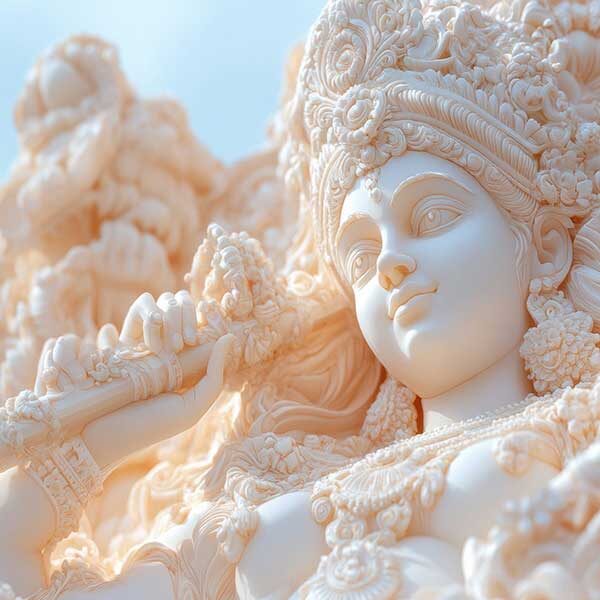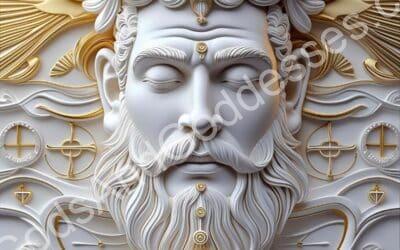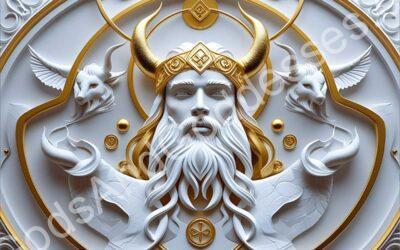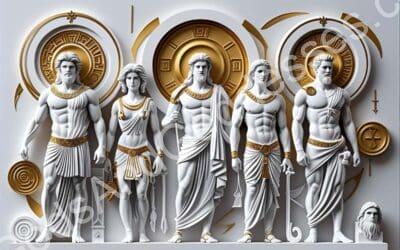Receive Our Newsletter
Resources and reminders to
live your Divine Destiny™
Introduction: Why God Names Matter
At GodsAndGoddesses.com, we provide a list of god names, and connect the wider worlds of mythology, goddesses, and gods to show how names reflect divine archetypes and cultural values. A god’s name is never just a label—it’s a story, a legacy, and an invocation of the sacred.
Across cultures, the names of gods carry immense power. From Zeus and Odin to Ra and Quetzalcoatl, these names were invoked for worship, protection, and cultural identity. Each one holds meaning tied to its mythology, acting as a doorway into tradition and belief.
“Every god’s name is a story waiting to be remembered.”
Key Takeaways About God Names
-
Cultural meaning – Greek names often reflect personality, Norse names connect to natural forces, and Egyptian names encode cosmic order.
-
Linguistic roots – Many god names link to power, fertility, light, or death, showing humanity’s fascination with these forces.
-
Global presence – Deities appear in every major mythology: Olympians in Greece, Æsir in Norse, Celtic lords of the land, and Egyptian gods of life and death.
-
Modern relevance – God names remain powerful today, inspiring spirituality, literature, art, and even baby names.
Explore Lists of God Names
-
Greek God Names → From Zeus to Hades, explore the Olympians and their meanings.
-
Norse God Names → Odin, Thor, Tyr, and the deities of Asgard.
-
Powerful God Names → A curated list of strong, inspiring names from multiple mythologies.
The Role of God Names in Mythology and Culture
God names were never chosen at random. They reflected a culture’s relationship with the divine, encoding qualities of strength, justice, fertility, wisdom, or fate into a single word. In ancient rituals, invoking the right name was seen as essential—whether to request protection, abundance, or guidance.
Even today, these names resonate. From novels and films to spiritual practices and baby naming traditions, the ancient gods live on through the enduring power of their names.
Greek God Names
-
Zeus – Sky and thunder, king of the gods.
-
Poseidon – Sea, earthquakes, and horses.
-
Hades – Lord of the underworld.
-
Apollo – Sun, music, prophecy, and healing.
-
Ares – War and bloodshed.
-
Hermes – Messenger of gods, trade, and trickery.
See more: Greek God Names.
Norse God Names
-
Odin – All-Father of wisdom, magic, and war.
-
Thor – Thunder god, protector of Midgard.
-
Loki – Trickster of chaos and transformation.
-
Tyr – Justice, law, and sacrifice.
-
Njord – Sea and wealth.
-
Freyr – Fertility, prosperity, and peace.
See also: Norse God Names.
Celtic God Names
-
Dagda – Father god of wisdom and abundance.
-
Lugh – Sun god of skill, war, and crafts.
-
Cernunnos – Horned god of nature and fertility.
-
Nuada – Leadership and healing.
-
Arawn – Lord of the Otherworld.
See: Celtic Gods.
Egyptian God Names
-
Ra – Sun god, creator of life.
-
Osiris – Afterlife and resurrection.
-
Horus – Sky god, protector of kings.
-
Set – Chaos, storms, and violence.
-
Thoth – Wisdom, writing, and magic.
-
Anubis – Death, embalming, and protection.
See more: Egyptian Gods.
Hindu God Names
-
Brahma – Creator of the universe.
-
Vishnu – Preserver and sustainer.
-
Shiva – Destroyer and transformer.
-
Ganesha – Wisdom and new beginnings.
-
Krishna – Love, compassion, devotion.
-
Indra – Storms, lightning, and war.
Other Cultural God Names
Mesopotamian Gods
-
Enlil – Storm and air.
-
Marduk – Chief Babylonian deity.
-
Tiamat – Primordial chaos.
Aztec Gods
-
Quetzalcoatl – Feathered serpent, creator.
-
Tezcatlipoca – Night and sorcery.
-
Huitzilopochtli – Sun and war.
Japanese Gods (Kami)
-
Izanagi – Creator god.
-
Susanoo – Storms and the sea.
-
Hachiman – War and protection.
Using God Names Today
Many people draw inspiration from god names for:
-
Storytelling and literature – novels, films, and poetry.
-
Spiritual practice – modern rituals and worship.
-
Personal empowerment – invoking strength, wisdom, or creativity.
-
Naming – children, pets, brands, or artistic works.
See also: Stories About Gods.
FAQs About God Names
Which god name is the oldest?
Likely Enlil and Anu from Mesopotamia (over 4,000 years old).
Why do gods have different names in different places?
Translation, cultural blending, and local traditions shaped names differently over time.
Are god names still used in religion today?
Yes—Hinduism, Shinto, and others still actively honor many deities by name.

Conclusion
From Zeus to Ra, Odin to Shiva, the names of gods echo the cultures that shaped them and the divine powers they embody. Learning these names is a way of honoring the past while finding inspiration in the present.
Explore further with:
“To list the gods is to glimpse the vast imagination of humanity across ages and cultures.”
Posts About God Names
Powerful God Names for Strength and Inspiration
Introduction: Why Powerful God Names Still Matter Across cultures and centuries, humans have turned to the names of gods for courage, power, and guidance. Some names strike like thunder, others...
Norse God Names and Their Meanings
Introduction: Why Norse God Names Still Matter The Norse gods are some of the most legendary deities in world mythology. Their names, drawn from Old Norse language, carry meanings that reflect...
Greek God Names: From Zeus to Hades
Introduction: Why Greek God Names Still Matter The names of the Greek gods are among the most famous in world mythology; they echo through epic poetry, philosophy, art, and modern culture. Each name...
- Odin God Story - August 24, 2025
- The Story of Ra: Egyptian Sun God and Creator - August 24, 2025
- Kraken: Mythological Sea Monster of the Deep - August 24, 2025




